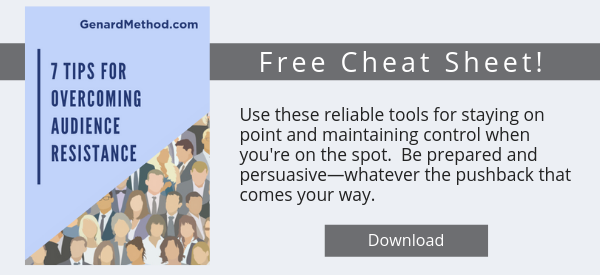
Had a brain freeze while presenting? Don't worry―your career isn't over. Here are 5 ways to keep your composure and get back in the game!
What do you do when your thoughts go one way, and your mouth goes the other?
However expert you are on your topic and however well you prepare, you're going to suffer a brain freeze at some point in a speech or presentation. It happens to all of us—and when it does, we may be the most surprised person in the room.
Last week, a client asked what he can do when he has a brain freeze in a talk, makes a mistake, and needs to recover. Yes, the word he used was "when," not "if." He was specifically concerned with what happens when he:
- Needs to regain composure.
- Trips over words.
- Forgets to breathe (as many people do who have speech anxiety).
Like my client, you or I aren't perfect speakers, so we'll mess up sometimes, either by ourselves or because we're being challenged. The key, then, isn't avoiding that brain freeze in the first place. It's what we do to recover, especially when there doesn't seem to be any time to do so.
Questions and challenges may show that your audience is paying attention. But can you stay in command when you're on the spot? Learn how in my free cheat sheet, "7 Tips for Overcoming Audience Resistance."
You're in Good Company with Brain Freezes
So if you're beating yourself up right now because of a recent "Oops!" moment on stage, steady yourself―and say hello to some of your fellow travelers:
- Joe Biden on the campaign trail recently: “Poor kids are just as bright and just as talented as white kids.”
- The spokesperson for National Straight Pride Coalition, earlier this month: “We’re a totally peaceful racist group.”
 Gov. Rick Perry of Texas, who in a presidential debate forgot the last of the "three" federal agencies he'd like to abolish (and then actually said "Oops!").
Gov. Rick Perry of Texas, who in a presidential debate forgot the last of the "three" federal agencies he'd like to abolish (and then actually said "Oops!"). - The woman who was referring to her spouse's new video camera when she said in her lecture, "My husband has some great new equipment and he kept me up all night."
- The speaker who wanted to show off his elementary Japanese by greeting his audience in Toyko with "Good morning, ladies and gentlemen," but was informed by someone in the audience that he'd just said, "Good morning, toilets and urinals."
Want to stay centered and poised in moments of stress? Learn how to get ready beforehand! Grab my essential cheat sheet "How to Calm Your Nerves Before Speaking."

Tactics Can Help In an Embarrassing Moment ...
Fortunately, the mind works at lightning speed―and no more so than when we need it to do so. That certainly applies to situations when we have to realize our plight, come up with a solution, and apply it, all in the blink of an eye!
Take the speaker who tripped up the stairs on the way to the lectern and declared: "I'm a professional. Don't try that at home." He demonstrated both wit and the ability to respond at true 'mind speed.' So is the presenter who lost her train of thought and covered with, "What did I just say? . . . Good, you're paying attention!"
My clients often say, when I demonstrate how they could express something more concisely, "I wish I could say it like that!" Sure, a lifetime of acting training helps. But I'm convinced that any of us can come up with a solution to an unexpected slip, even in a keynote speech or motivational speaking. The reason is simple but profound: you bring with you the wealth of knowledge and experience that made you the right person to give this speech in the first place.
To maintain this kind of presence of mind at difficult speaking moments, download my free cheat sheet, "10 Ways to Stay Fully Focused when Speaking."
... But These 5 Strategies to Avoid Mistakes Are Better
Then again, why take the chance of needing a quick-as-a-wink response in a questionable public speaking moment? Wouldn't it be better to arm yourself beforehand so you have strategies in place to avoid the mistake altogether? I think it is. Here, then, are five approaches to get you on more solid ground when those all-too-human errors rear their heads:
1. Never lose your composure in the first place. Recovering anything that you've lost is tough. Why not keep it from getting lost in the first place? Then, when that goof occurs, you'll be much better poised to a) regain your momentum, or b) avoid the appearance of a mistake altogether. You can do this in three ways: (1) Breathe diaphragmatically, i.e., "belly breathe", (2) Use supportive body language, and (3) Control your pace and tempo. Together, this threesome of composure skills will give you the look, sound, and (from your point of view) feel of control.
2. Go forward, without drawing attention "back" to your mistake. If you trip over words, simply say the thing again using the right words. If your manuscript drops to the floor and scatters, pick it up and take the time you need to get the pages in the right order again. Saying something like, "Wow, I can't talk tonight!" or "I'm such a klutz!" draws attention back to your "Oops" moment and also prolongs it. Go on, already!
3. Be open, not hiding. One of the things that creates acute self-consciousness is trying to cover up for what and who we really are. There may be many reasons for this, but whatever the cause, trying to hide from your audience is an impossibility. If you are defensive or trying to be better than you really are, you'll be fragile, and recovering will be that much more difficult. Stay vulnerable with audiences. They'll like you more, and feel that you're a person they can trust. That adds up to priceless credibility.
4. Live in the present moment. The here-and-now of your speech is really all you have to reach audiences. Shakespeare's plays may be exciting to read now―but think how much more powerful they must have been when performed at the Globe playhouse in 1599. Stage presence for a speaker more than anything means being fully present. If you're 100% present, it's a surer bet that something of value will take place. It also means you'll be much less likely to make a mistake (often due to lack of focus) in the first place. How do you achieve that level of presence? Invest yourself completely in your audience's needs rather than your own. Most likely, your talk will flow organically and easily.
5. See your speech as a chance to communicate, not to excel. Try to be "excellent" and you'll probably never get there. Do your best to get your message across to listeners, on the other hand, and there'll be nothing to stop you. The paradox of acting comes perfectly into play in this context: Audiences believe an actor is a character in a play or movie not because of artifice, but because of truth. The actor is true to every moment in the life of that character as it unfolds. If you're true to the communication situation, you hardly can make a mistake. And if you do make one, well, it won't matter, will it?
This article was originally published in 2014. It is updated here.
You should follow me on Twitter here.





